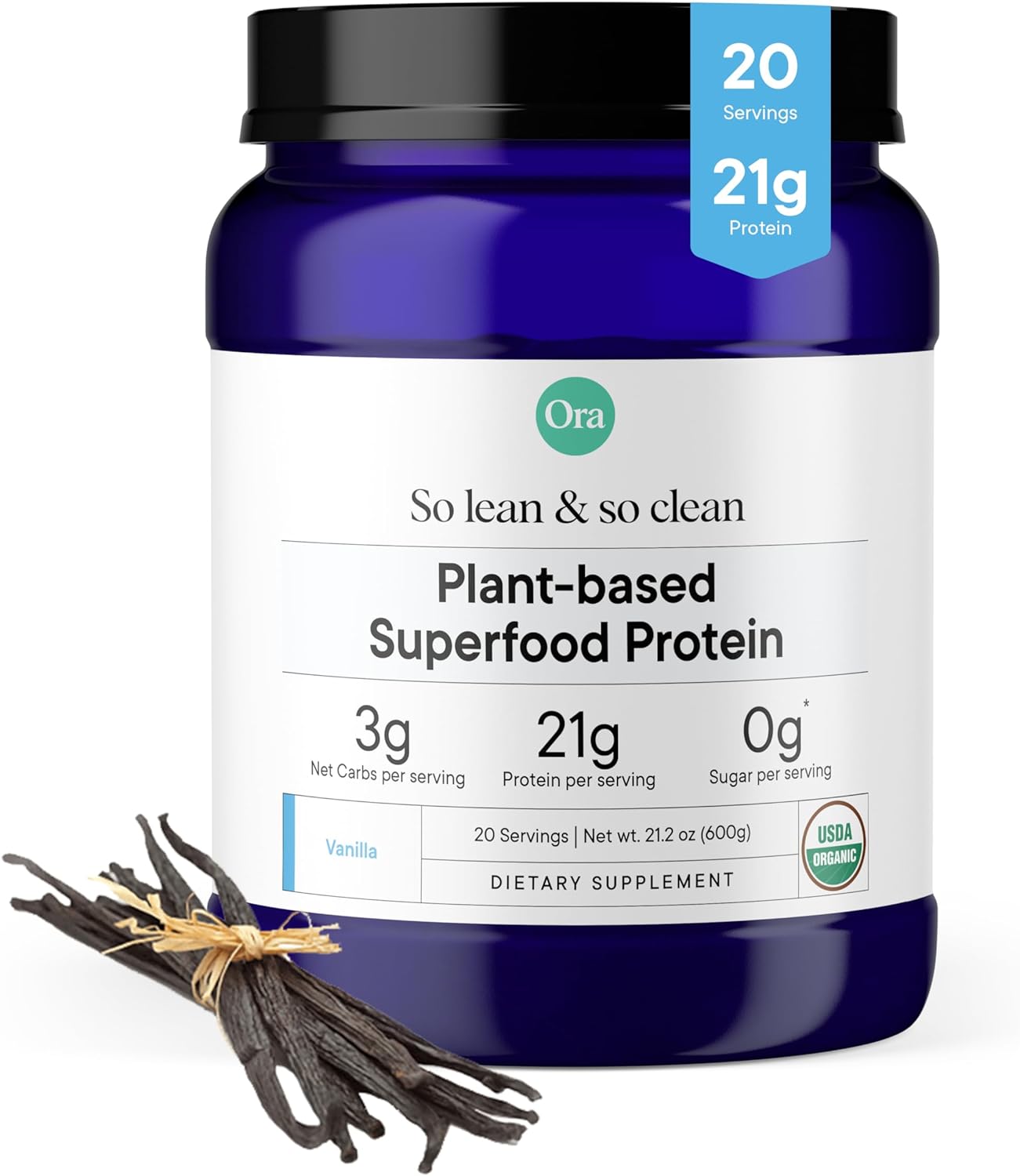
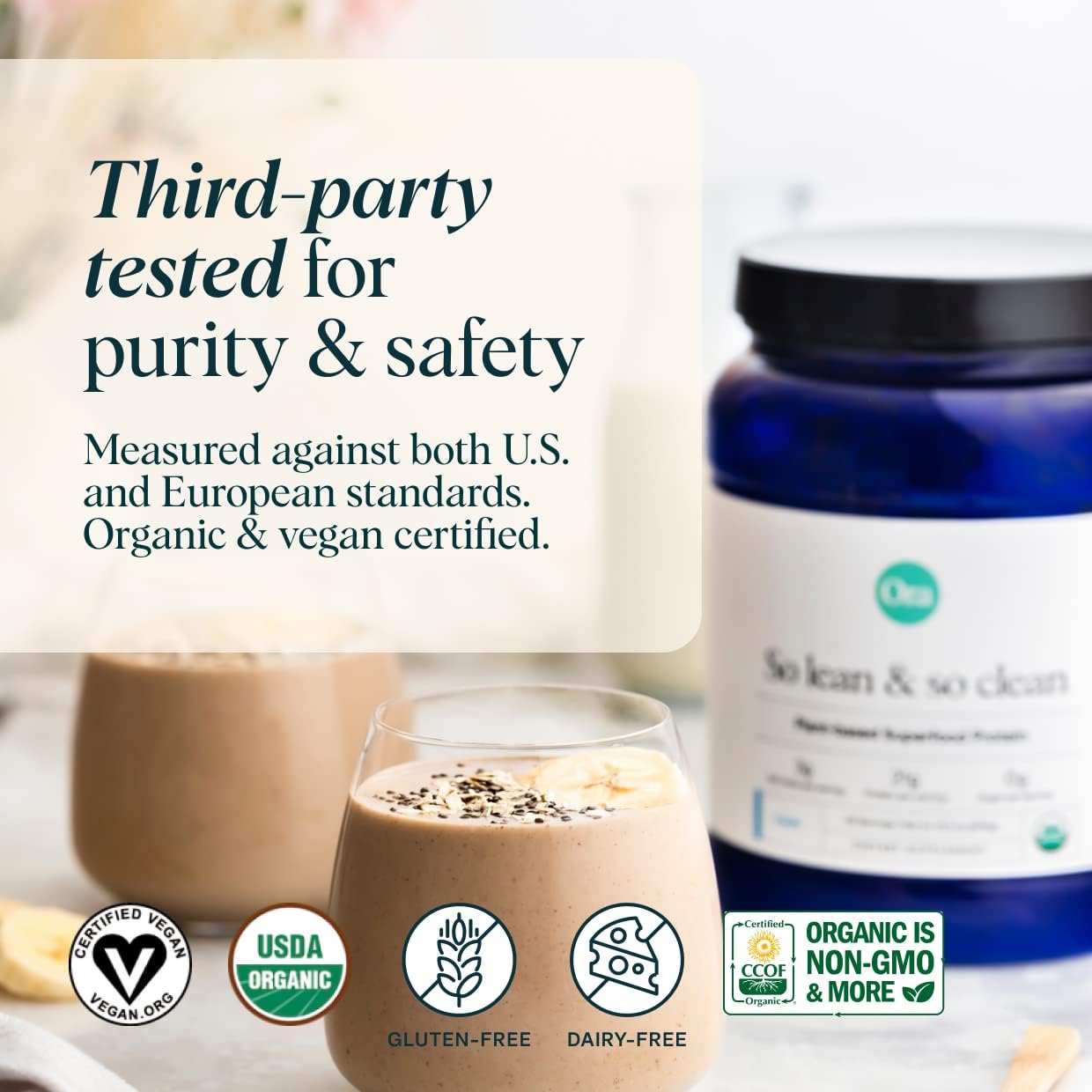
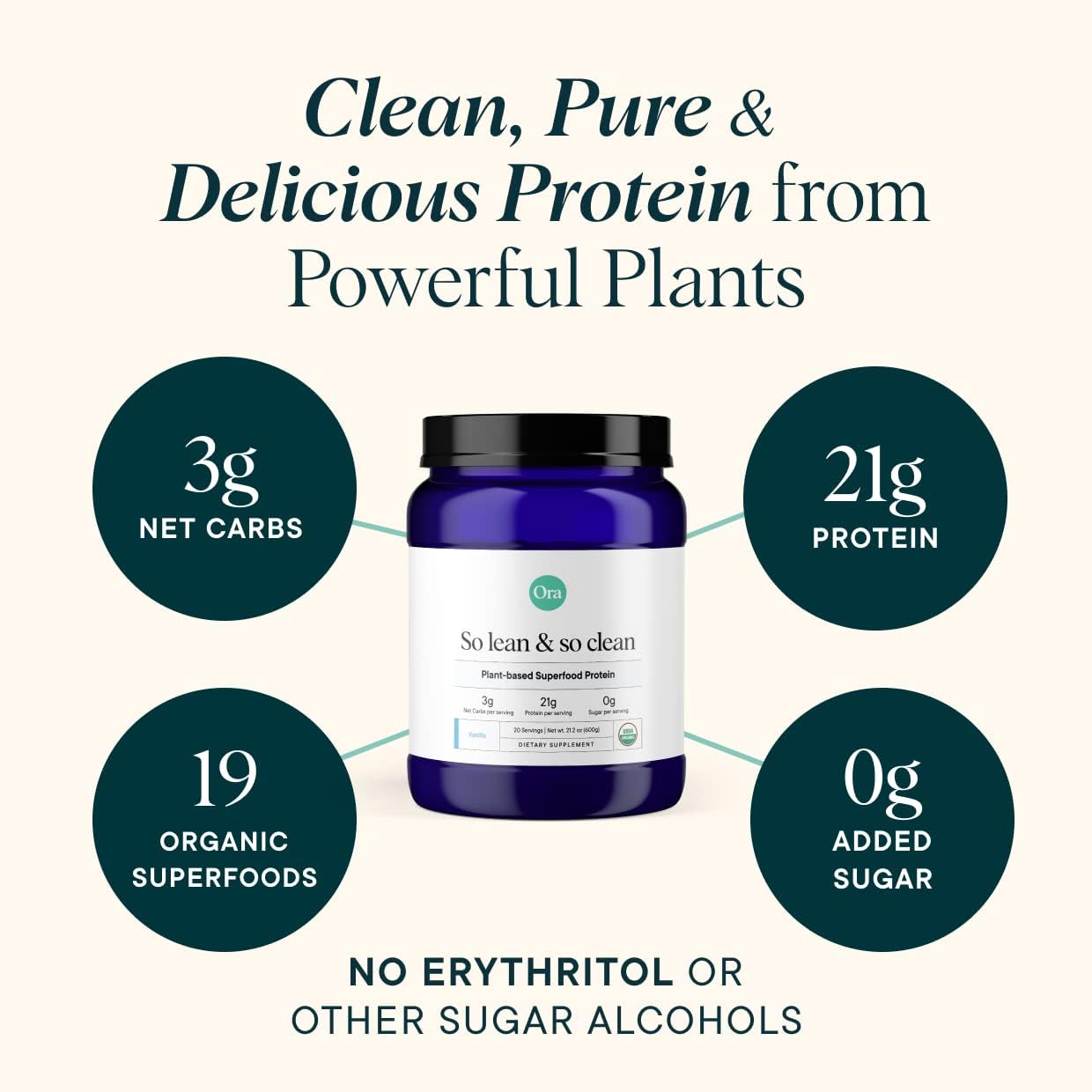
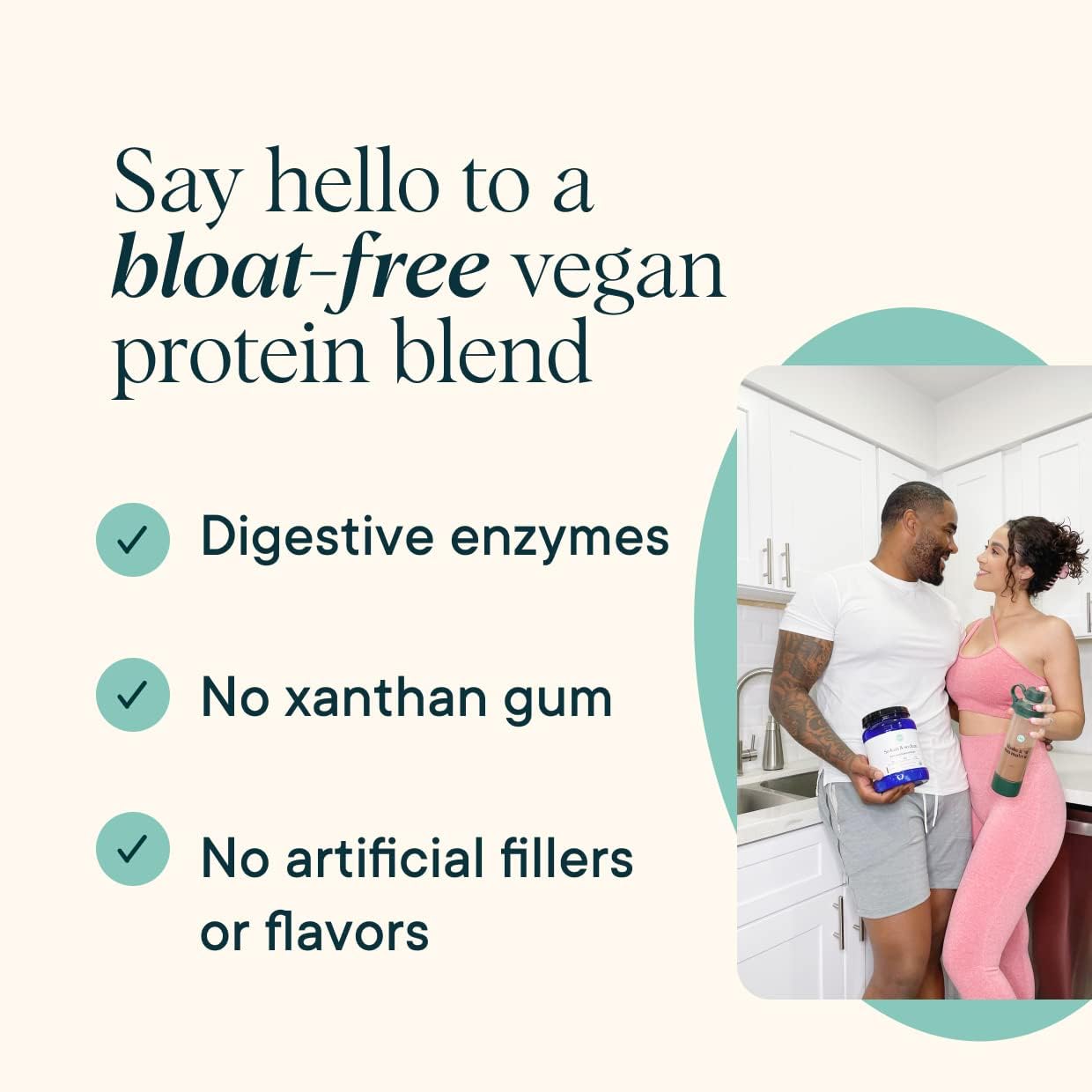
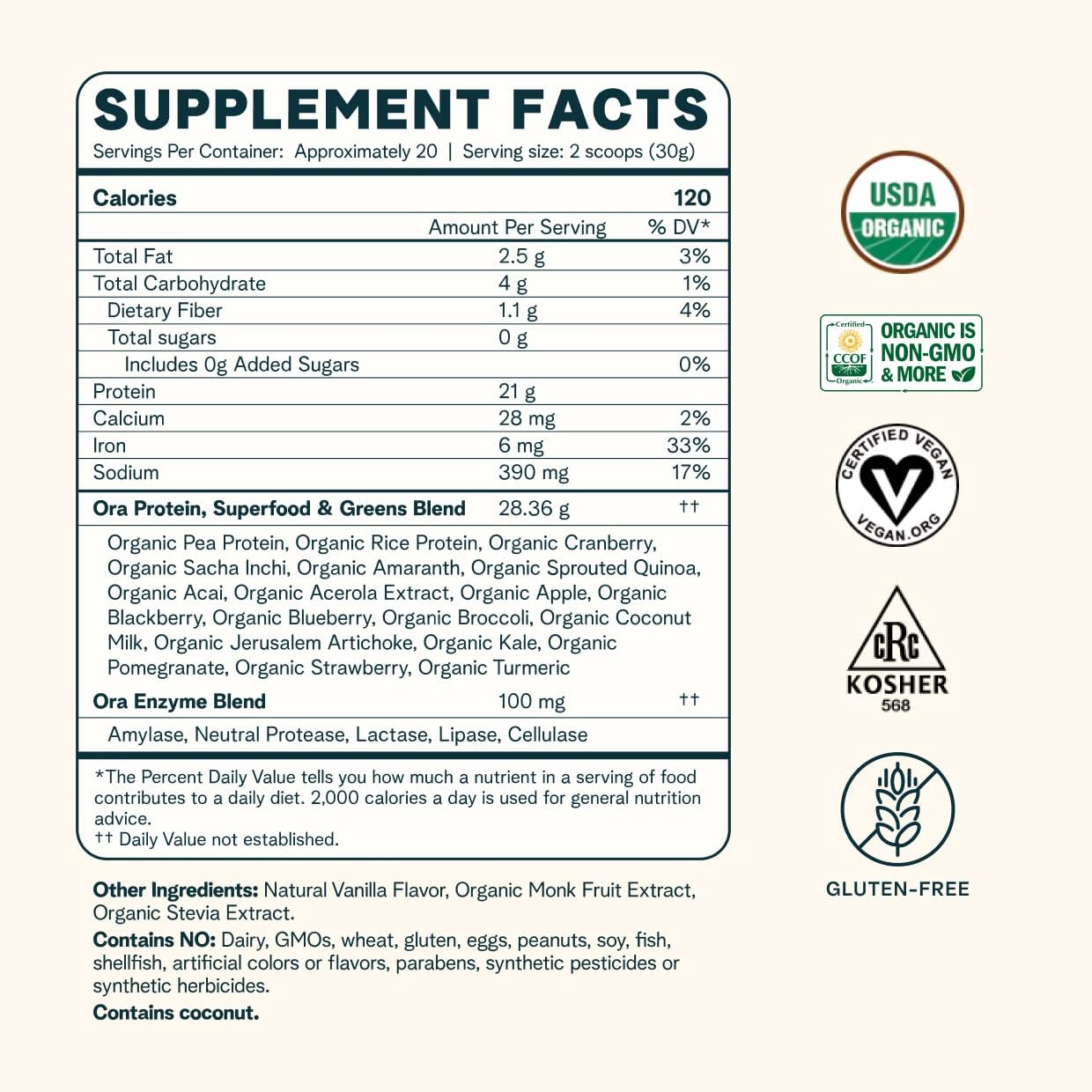
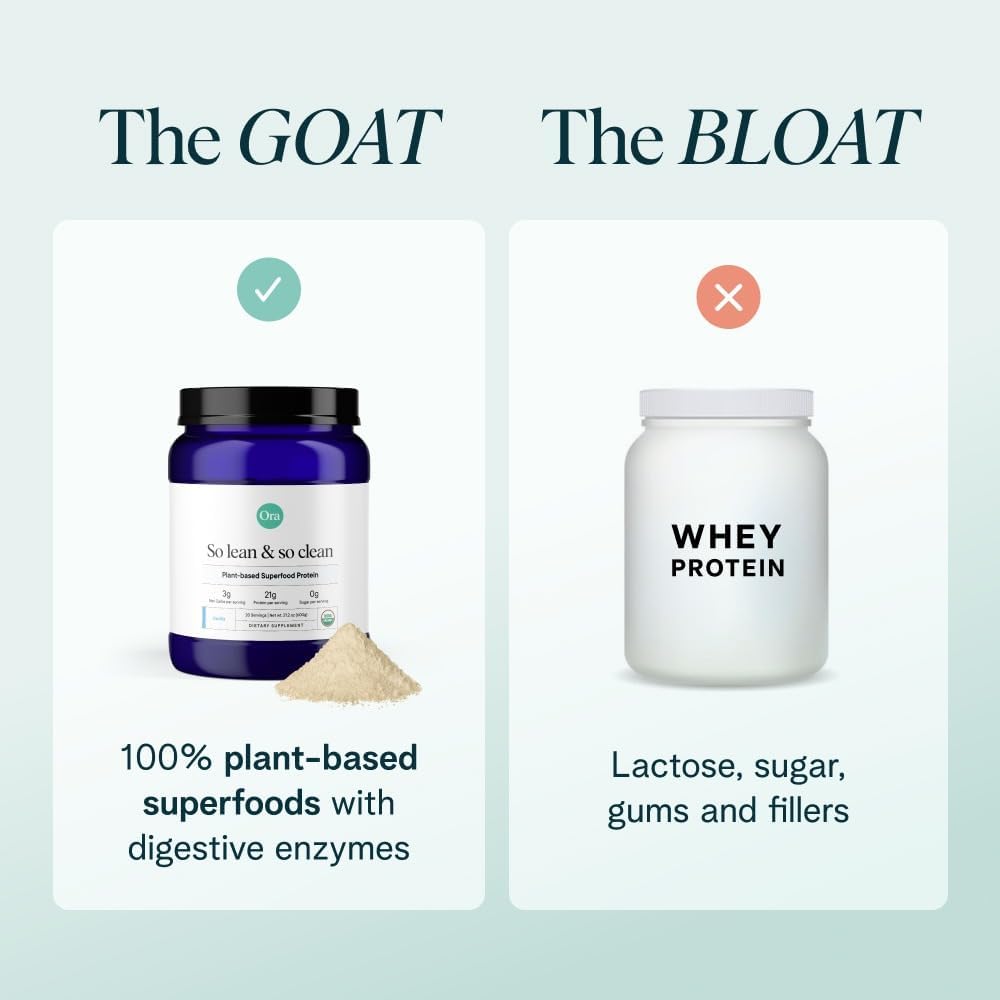
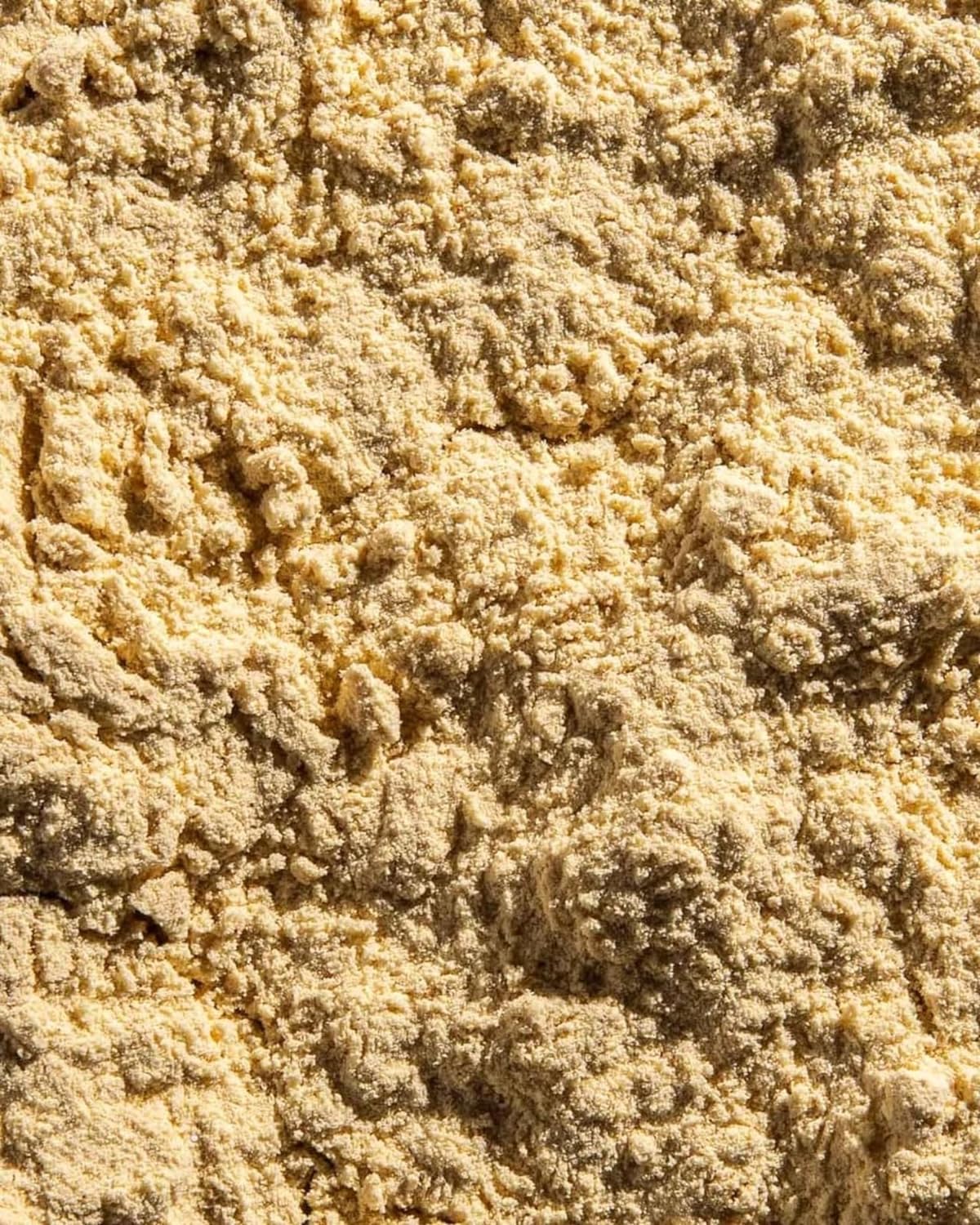
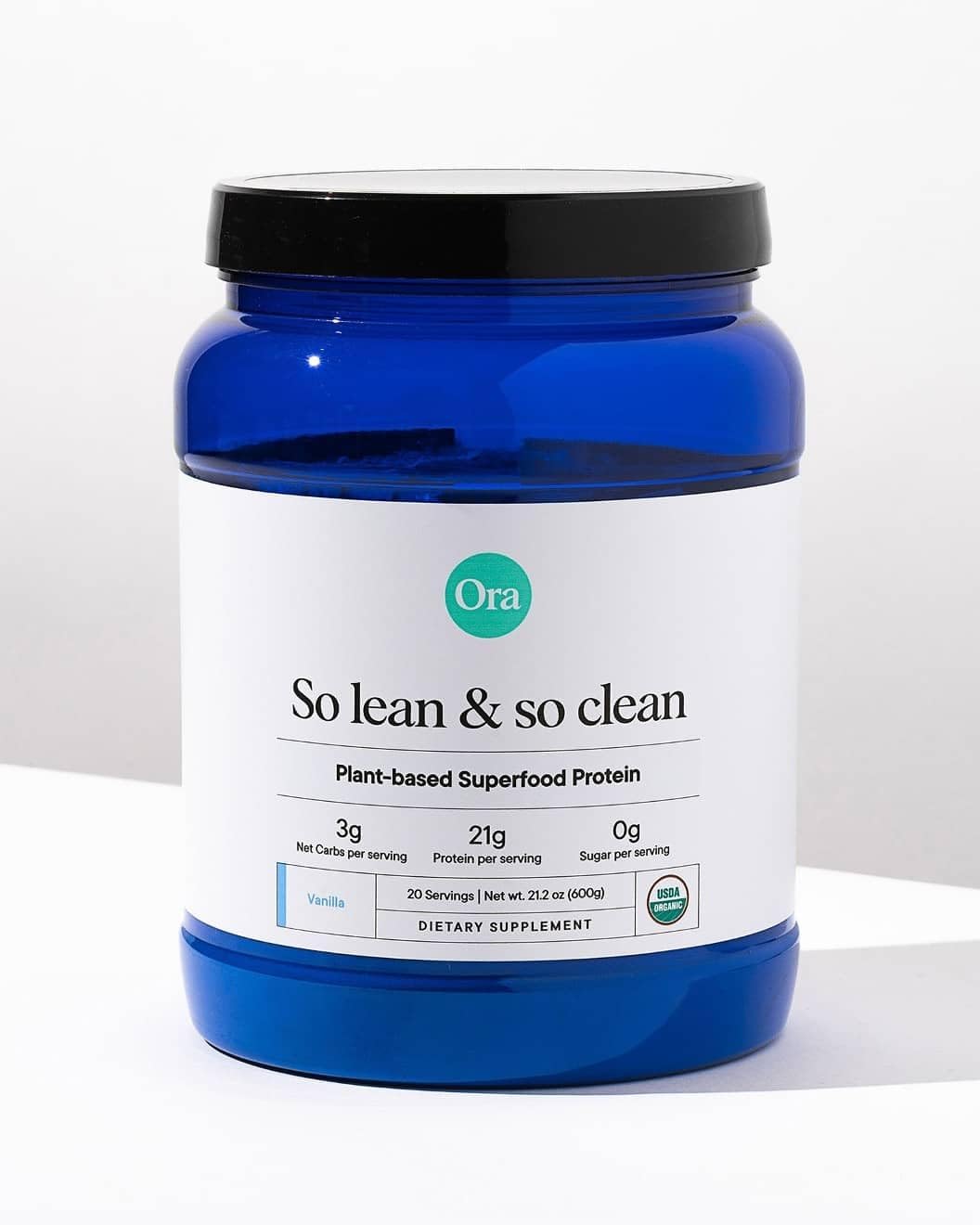
Ora Organic Protein Powder - 21g Plant-Based Protein, 19 Superfoods, Vanilla Flavor - 20 Servings


Lipase
Medium RiskLipase is an enzyme that hydrolyzes triglycerides, facilitating the digestion and absorption of fats in the body. It plays a crucial role in lipid metabolism and is commonly used in various food and dietary products to enhance fat breakdown.
Sustai Insights
Lipase serves as an effective digestive aid, promoting fat metabolism and improving nutrient absorption. It is generally recognized as safe, with low concerns regarding carcinogenicity and developmental toxicity. However, there is a moderate risk of allergies and immunotoxicity. Environmental impacts are minimal, but regulatory bodies have placed some restrictions on specific uses. Overall, the risk level is assessed as medium, and users should follow safe usage recommendations. Alternatives such as other digestive enzymes may offer similar benefits.
Amylase
Low RiskAmylase is an enzyme that catalyzes the breakdown of starches into sugars. It is commonly used in food processing, detergents, and other industrial applications to enhance product functionality. Its effectiveness depends on specific conditions, such as temperature and pH, making it versatile in applications ranging from baking to stain removal.
Sustai Insights
Amylase offers functional benefits by efficiently breaking down starches, enhancing food texture and cleaning performance. It is widely recognized as safe and biodegradable, aligning with sustainability goals. However, exposure may pose irritation risks for individuals with enzyme allergies, particularly through inhalation or skin contact. Regulatory assessments classify amylase as generally safe, with no carcinogenic or endocrine-disrupting properties reported. Environmental risks are minimal due to its natural degradability, and its use in products typically adheres to stringent safety standards. While alternative enzymes exist, amylase remains a preferred choice due to its efficiency and low overall risk, which is considered manageable with appropriate precautions.
Inulin
Low RiskInulin is a polysaccharide that functions primarily as a dietary fiber and prebiotic, often used to enhance the texture and nutritional profile of various food products. It is derived from plants like chicory and is known for its ability to improve digestive health and promote beneficial gut bacteria.
Sustai Insights
Inulin offers functional benefits as a prebiotic, supporting gut health and enhancing food texture. It is biodegradable and sustainably sourced from plants, contributing to environmentally friendly practices. Health risks are low, with minimal concerns regarding carcinogenicity and allergies. While regulatory restrictions apply to certain products, overall, the ingredient is considered low risk. Safe usage involves adhering to recommended dietary levels, and alternatives like other soluble fibers can be considered for those seeking different options.
Cellulase
Low RiskCellulase is an enzyme that breaks down cellulose into simpler sugars. It is commonly used in detergents to remove plant-based stains and in food processing to enhance the digestibility of plant materials. Cellulase is derived from microbial sources and functions effectively under controlled conditions.
Sustai Insights
Cellulase offers valuable functional benefits, including its ability to efficiently degrade cellulose, making it highly effective for stain removal and food processing applications. It is generally regarded as safe, with low health risks; rare allergic reactions have been reported but remain uncommon. Environmentally, cellulase has a negligible pollutant potential and is biodegradable, contributing to its sustainability profile. Regulatory bodies such as the FDA and EU agencies permit its use, provided it meets established purity and safety standards. Overall, cellulase is classified as a low-risk ingredient. Safe use involves adhering to recommended concentrations to minimize any allergenic potential. Sustainable microbial production and the absence of significant environmental hazards enhance its appeal, with no direct substitutes offering comparable functionality and sustainability benefits.
Punica Granatum (Pomegranate)
Low RiskPunica granatum, commonly known as pomegranate, is a fruit-derived ingredient used in various cosmetic and personal care products. It is primarily recognized for its antioxidant properties and is often included for its potential benefits in skin health and hydration.
Sustai Insights
Pomegranate is valued for its antioxidant benefits, which may help protect skin from oxidative stress. It is generally considered low risk regarding health concerns, with minimal evidence linking it to carcinogenicity, allergies, or reproductive toxicity. Environmentally, it poses low risks as it is not classified as a pollutant or bioaccumulative. Regulatory assessments indicate no current restrictions. Safe usage practices should be followed, with potential alternatives including other fruit extracts for similar benefits. Overall, the ingredient presents a low risk profile.
Amylase
Low RiskAmylase is an enzyme that catalyzes the breakdown of starches into sugars. It is commonly used in food processing, detergents, and other industrial applications to enhance product functionality. Its effectiveness depends on specific conditions, such as temperature and pH, making it versatile in applications ranging from baking to stain removal.
Sustai Insights
Amylase offers functional benefits by efficiently breaking down starches, enhancing food texture and cleaning performance. It is widely recognized as safe and biodegradable, aligning with sustainability goals. However, exposure may pose irritation risks for individuals with enzyme allergies, particularly through inhalation or skin contact. Regulatory assessments classify amylase as generally safe, with no carcinogenic or endocrine-disrupting properties reported. Environmental risks are minimal due to its natural degradability, and its use in products typically adheres to stringent safety standards. While alternative enzymes exist, amylase remains a preferred choice due to its efficiency and low overall risk, which is considered manageable with appropriate precautions.
Inulin
Low RiskInulin is a polysaccharide that functions primarily as a dietary fiber and prebiotic, often used to enhance the texture and nutritional profile of various food products. It is derived from plants like chicory and is known for its ability to improve digestive health and promote beneficial gut bacteria.
Sustai Insights
Inulin offers functional benefits as a prebiotic, supporting gut health and enhancing food texture. It is biodegradable and sustainably sourced from plants, contributing to environmentally friendly practices. Health risks are low, with minimal concerns regarding carcinogenicity and allergies. While regulatory restrictions apply to certain products, overall, the ingredient is considered low risk. Safe usage involves adhering to recommended dietary levels, and alternatives like other soluble fibers can be considered for those seeking different options.
Cellulase
Low RiskCellulase is an enzyme that breaks down cellulose into simpler sugars. It is commonly used in detergents to remove plant-based stains and in food processing to enhance the digestibility of plant materials. Cellulase is derived from microbial sources and functions effectively under controlled conditions.
Sustai Insights
Cellulase offers valuable functional benefits, including its ability to efficiently degrade cellulose, making it highly effective for stain removal and food processing applications. It is generally regarded as safe, with low health risks; rare allergic reactions have been reported but remain uncommon. Environmentally, cellulase has a negligible pollutant potential and is biodegradable, contributing to its sustainability profile. Regulatory bodies such as the FDA and EU agencies permit its use, provided it meets established purity and safety standards. Overall, cellulase is classified as a low-risk ingredient. Safe use involves adhering to recommended concentrations to minimize any allergenic potential. Sustainable microbial production and the absence of significant environmental hazards enhance its appeal, with no direct substitutes offering comparable functionality and sustainability benefits.
Lipase
Medium RiskLipase is an enzyme that hydrolyzes triglycerides, facilitating the digestion and absorption of fats in the body. It plays a crucial role in lipid metabolism and is commonly used in various food and dietary products to enhance fat breakdown.
Sustai Insights
Lipase serves as an effective digestive aid, promoting fat metabolism and improving nutrient absorption. It is generally recognized as safe, with low concerns regarding carcinogenicity and developmental toxicity. However, there is a moderate risk of allergies and immunotoxicity. Environmental impacts are minimal, but regulatory bodies have placed some restrictions on specific uses. Overall, the risk level is assessed as medium, and users should follow safe usage recommendations. Alternatives such as other digestive enzymes may offer similar benefits.
Punica Granatum (Pomegranate)
Low RiskPunica granatum, commonly known as pomegranate, is a fruit-derived ingredient used in various cosmetic and personal care products. It is primarily recognized for its antioxidant properties and is often included for its potential benefits in skin health and hydration.
Sustai Insights
Pomegranate is valued for its antioxidant benefits, which may help protect skin from oxidative stress. It is generally considered low risk regarding health concerns, with minimal evidence linking it to carcinogenicity, allergies, or reproductive toxicity. Environmentally, it poses low risks as it is not classified as a pollutant or bioaccumulative. Regulatory assessments indicate no current restrictions. Safe usage practices should be followed, with potential alternatives including other fruit extracts for similar benefits. Overall, the ingredient presents a low risk profile.
Discover the power of Ora Organic Protein Powder, a deliciously nutritious blend designed for both women and men. Packed with 21g of plant-based protein and 19 superfoods, this gluten-free powder is perfect for fueling your fitness goals while being gentle on your stomach.
- Complete Amino Acid Profile: Enjoy optimal muscle building with a blend of organic pea and rice protein, ensuring all essential amino acids are included in every serving.
- Natural Sweetness: Sweetened with stevia and monk fruit, this protein powder contains no added sugars or sugar alcohols, making it pregnancy-safe and suitable for all ages.
- Award-Winning Flavor: Mix it into smoothies or recipes for a delicious, nutritious boost that kids will love. Combine it with fruits and nut butter for a satisfying shake.
- Gentle on Digestion: Free from bloat, this formulation includes digestive enzymes that enhance protein absorption, making it ideal for sensitive stomachs.
- Versatile for Everyone: Whether aiming to gain muscle or recover post-workout, this convenient protein powder seamlessly fits into any daily routine.
Subscribe & Save with Sustai
- Best Price Guarantee: Always enjoy the lowest prices on sustainable home essentials.
- No Surprises: We’ll notify you before shipping. No hidden fees, ever.
- You’re in Charge: Change, pause, or cancel your subscription anytime with ease.
- Eco-Friendly Deliveries: Our grouped shipments mean less packaging and lower emissions.
Join us on a sustainable journey. Special offers for a limited time! Prices and promotions may change.
Recommended Products
Discover the power of Ora Organic Protein Powder, a deliciously nutritious blend designed for both women and men. Packed with 21g of plant-based protein and 19 superfoods, this gluten-free powder is perfect for fueling your fitness goals while being gentle on your stomach.
- Complete Amino Acid Profile: Enjoy optimal muscle building with a blend of organic pea and rice protein, ensuring all essential amino acids are included in every serving.
- Natural Sweetness: Sweetened with stevia and monk fruit, this protein powder contains no added sugars or sugar alcohols, making it pregnancy-safe and suitable for all ages.
- Award-Winning Flavor: Mix it into smoothies or recipes for a delicious, nutritious boost that kids will love. Combine it with fruits and nut butter for a satisfying shake.
- Gentle on Digestion: Free from bloat, this formulation includes digestive enzymes that enhance protein absorption, making it ideal for sensitive stomachs.
- Versatile for Everyone: Whether aiming to gain muscle or recover post-workout, this convenient protein powder seamlessly fits into any daily routine.

You can have at most 2 Sustainable Steals products in your cart
Customer Reviews
Customers’ View
Customers generally appreciate the quality and blendability of this pre-workout supplement, highlighting its clean, plant-based protein sourced from organic ingredients. Many users commend the product for being easy to mix into smoothies and recipes without overpowering other flavors. Several reviews emphasize the stomach comfort it provides, noting that it does not cause bloating or digestive issues, which is a significant concern for health-conscious consumers. However, opinions on taste are mixed, with some finding it enjoyable while others describe it as an acquired taste. Additionally, some customers express concerns about the smell and perceived value for money, indicating a desire for better packaging options. Overall, this product is well-received for its health benefits and eco-friendly ingredients, making it a noteworthy choice for those focused on wellness.
AI-generated from the text of customer reviewsThis product is rated 4.6 of 5.0 stars.
It has received 595 reviews.




